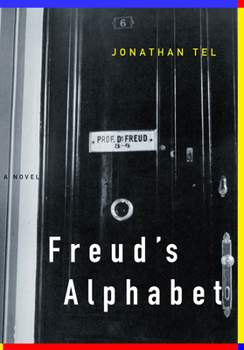Freud's Alphabet
At once a delightfully inventive chronicle of Freud's last days and an insightful reflection on Freudian existence. A brilliantly inventive and intelligent first novel about Freud's last years in London, psychoanalysing the nation as it slips into the collective madness of World War Two. Freud-- dying of cancer--has come to London to escape persecution in Austria, bringing with him his famous couch, his collection of tribal totems and his insights into the English. Cared for by his biographer and doctor, Jones, Freud explores the city of Woolf and Eliot, of bankers, fishwives and travelling tradesmen, considering everything in the light of his own desire to find an underlying, rational explanation for irrational behaviour. The city, in turn, asserts its own surrealism, defying explanation, happy to prove one thing and also its opposite. In the background, the nation prepares for its greatest act of rational madness--war. Jonathan Tel's first novel is a small masterpiece: a brilliant and playful insight into Freud and the English; and a beautiful evocation of the period, with its buses and fogs and housewives and men in suits. It is a surrealist Wasteland, a post-modern Mrs. Dalloway .
Format:Hardcover
Language:English
ISBN:1582432198
ISBN13:9781582432199
Release Date:July 2003
Publisher:Counterpoint LLC
Length:188 Pages
Weight:0.65 lbs.
Dimensions:0.9" x 5.8" x 8.6"
Customer Reviews
2 ratings
P is for Pretty Good
Published by Thriftbooks.com User , 21 years ago
Sigmund Freud never wanted to leave his homeland of Austria. Finally, surrounded by Nazis, he was left with no choice and allowed himself to taken to London to die. This book in a way chronicles his last days in a foreign land he couldn't stand (or understand), tormented by cancer and a painful prosthetic palate.But this isn't your Irving Stone historical fiction. The book is a collection of 26 short stories or episodes, each with an alphabetical Freud-appropriate theme per letter (Id for I, Sleep for S, etc.). The stories themselves are dreamlike; there is little dialogue or action, but hazy descriptions of Freud's internal and external environment. Moods and settings are painted well, but in short and choppy Celine-ish sentences, giving off a feeling of what must've been a zoned-out time for the heavily drugged and dying doctor, perceiving a bleak and unknown London days leading up to WWII. Freud's Alphabet doesn't offer too much historical insight into Freud's last days, but you do get a powerful sense of that disorienting stranger-in-a-strange-land feeling, compounded by his pain, a zombified morphine state, and the lurking shadows of war. If you were wondering about Freud's attitudes toward his work or place in history, you won't find it here. But then again, perhaps these stories do more accurately reflect what must've been a very dreamlike mind-state. It's a short book and not worth the hefty $24 cover price, but you may want to take out of the library or pick it up on sale. It may not be for Freud fanatics, as it is less of a book on Freud, than a refreshing look at pre-war London. But more than that, it's a lovely showcase of Jonathan Tel's imaginative style.
A Thought Provoking Fable
Published by Thriftbooks.com User , 21 years ago
Be aware that this is not a novel in the strict sense. It is a series of short vignettes, not unlike Hemingway's story frgaments in "in our time". (This is not to compare Tel's & Hemingway's styles in any way.) Though "Freud's Alphabet" does chronicle Freud's last days in London somewhat, it is more a collection of meditations on life in England circa 1939 as seen through a very perceptive foreigner who is slowly dying, painfully, of cancer. Is "Freud's Alphabet" an homage? A pastiche? Is it meant ironically? Whatever the author's intentions, he succeeds wonderfully. He brilliantly evokes a man, a time, and a culture that is long gone. A well written work of short length (I read it in a quiet evening) but much depth.






